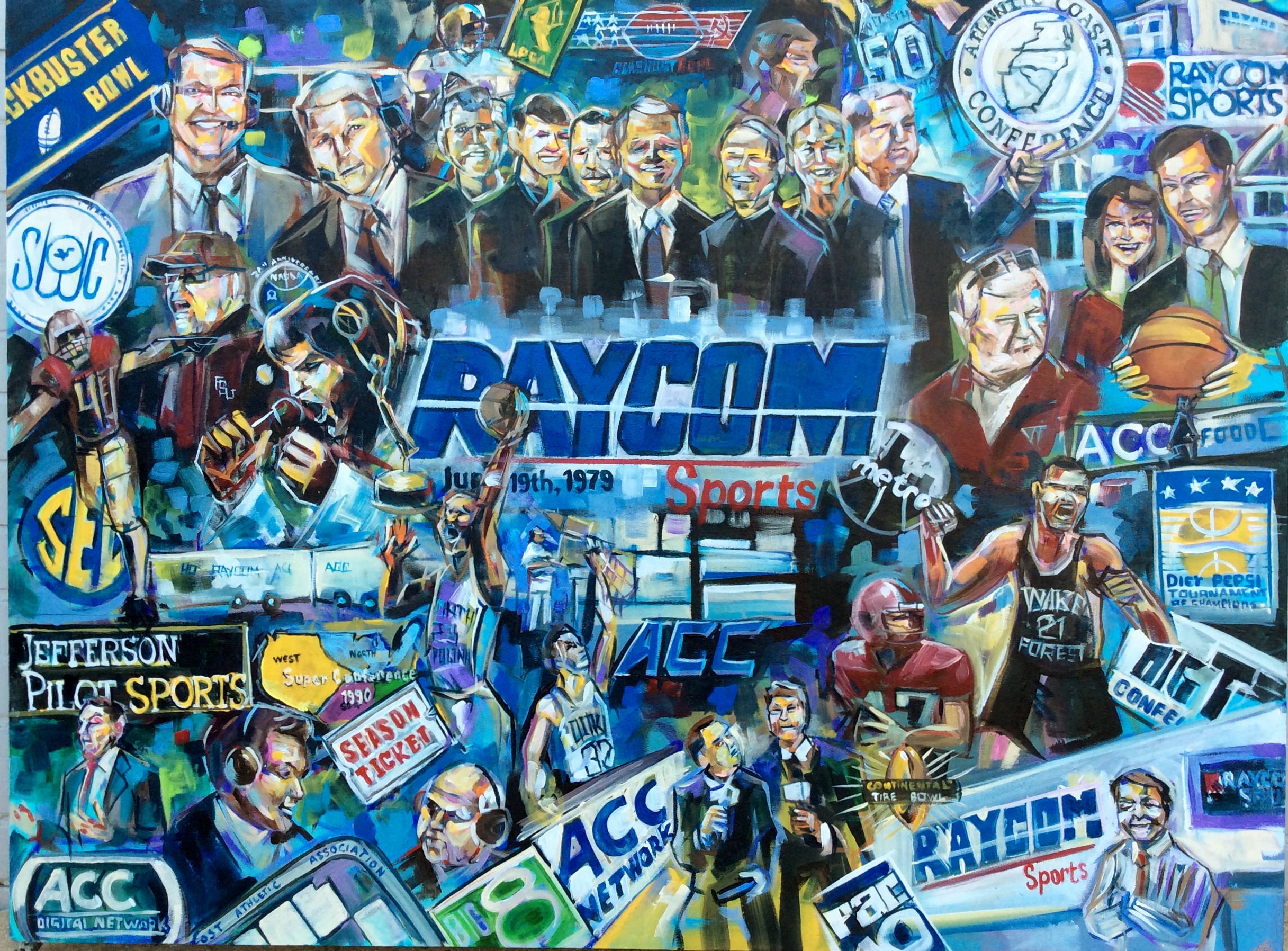- Founding
- Building the Brand
- Events
- Bowls
- College Basketball
- Golf
- Sports and Entertainment Programming
- More Than A Game
- Elvis Specials
- Unsuccessful Entertainment Programming
- Sales and Marketing
- ACC Properties
- Raycom, JP Sports and The ACC
- JP Sports
- Digital Media and New Ventures
- Raycom Ownership
- Raycom Sports Management
Founding
The history of Raycom Sports dates to June 19, 1979 when it was founded.(1) It has become one of the most widely recognized names in sports television.
Televised college sports was confined in 1979 to a Saturday football game on ABC, weekend basketball games on NBC and some regionally televised conference basketball packages. The most notable being C.D. Chesley’s production(2) of Atlantic Coast Conference (ACC) games on a syndicated network of east coast television stations.(3) ESPN, established in September 1979, was new and satellite transmission for cable network programs was in its infancy.
Also in 1979, Rick Ray, a 30 year-old television program manager with WCCB-TV in Charlotte, NC decided that there was more interest in college basketball on television than was being provided by the networks or local television stations. When WCCB disagreed with his concept for producing more basketball games, Ray then left the station.(4)
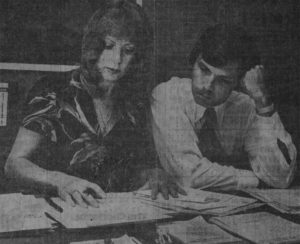
He and his partner, Dee Birke who owned and operated an advertising agency, traveled to Alaska to produce the Sea Wolf Classic, a tournament Ray later renamed the Great Alaska Shootout.(5)(6) Thus began a career of buying rights to games, and producing, syndicating and selling commercials to cover expenses. The company was named Raycom, short for Ray Communications.
Following the success of their first project, Ray and Birke embarked on a mission to acquire the television rights to the prestigious ACC. Raycom’s goal was to be a sports TV Network that could rival that of C.D. Chesley and NBC. In 1980, Raycom obtained the local television rights to the two largest universities within the ACC region, but not a part of the conference: Virginia Tech and the University of South Carolina.(7) Raycom also telecast a five game ACC package including the Iron Duke Classic.(8) Rick Ray and Dee Birke were married in 1980.
Raycom’s success with those universities and selected games from other local schools, most notably the University of North Carolina, provided experience and expertise for the company to bid for the rights to the ACC. The C.D. Chesley Company paid $600,000 for ACC basketball television rights for the 1979-1980 season. They agreed to pay the ACC $1 million for the 1980-81 season, but the ACC bought out the Chesley agreement and accepted a $3.75 million offer from Metrosports of Rockville, Md.(9) In a joint venture, Raycom and Capitol Broadcasting of Raleigh, N.C., as well as several other syndication networks including Jefferson-Pilot Sports, submitted unsuccessful bids.
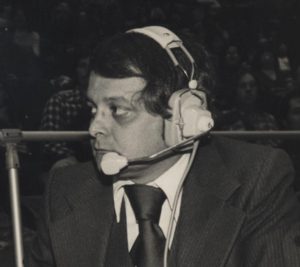
After the 1980-81 season, the ACC rejected a bid by Metrosports to renew their contract. Raycom Sports and Jefferson-Pilot Sports formed a 50/50 joint venture, Raycom/JP, and submitted a bid. The ACC was impressed with the two Charlotte companies working together and accepted the Raycom/JP bid,(9) a three-year, $18 million contract which provided the ACC with rights fees of $5, $6 and $7 million over the next three years. Raycom/JP also launched ACC Sports Center, which aired before each regional telecast.(10)
Ken Haines was hired before the start of the first ACC telecast season. As executive to the president at Virginia Tech and the University’s public affairs spokesperson,(11)(12) Haines brought university experience into the company.(13)
Building the Brand
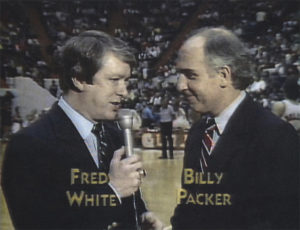
Virginia at Duke on Wednesday, December 8, 1982 at 9pm(14) was the first Raycom ACC conference telecast and featured announcers Fred White and Billy Packer.(15) The sponsors on that first telecast included Piedmont Airlines, Belk-Leggett Stores, Budweiser/Natural Light, Chrysler, NCNB, Mazda, Holiday Inn, Hardee’s and Jefferson Pilot Life Insurance. The second year included sponsors such as Food Lion, who remains an active ACC Corporate Partner.(3) In just two short years, Raycom had become a major force in college sports television.
In 1983, Don McGuire,(16) a senior producer from NBC Sports, was hired and a year later, Wayne Spransy, a Charlotte CPA, was brought into the company. For the next five years, the company had Rick Ray acquiring new products, Dee Ray selling advertising, McGuire producing games, Spransy handling finances and Haines scheduling games and managing operations.
Raycom/JP games were distributed to stations over landlines leased from AT&T. Stations released their telco lines that received ABC, CBS and NBC programming to be able to obtain the ACC games. After the games, the lines were returned to the stations so they could receive their network programming.(17)
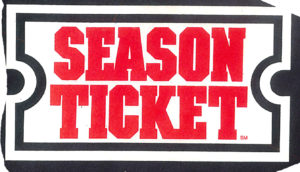
The 1982-83 season found Raycom/JP and ESPN launching a pay cable network of ACC basketball games titled “Season Ticket“.(18) The controversial project angered fans,(19) prompted lawsuits and legislation,(20) and experienced distribution problems. It eventually failed, however it was the forerunner of the first pay cable package of more than just a single event.(21)
In March, 1984, the ACC extended the Raycom/JP television contract through the 1990 season.(22) A four year extension was then announced in 1988.(23) And in 1994, another extension was announced through the 2001 season.(24)
The syndicated Raycom model for televised college sports events was different from traditional syndication techniques and it distinguished the company from its competitors.(1)
From the start, Raycom had a unique business model. Instead of sharing equal advertising inventory with television stations, the company paid monetary compensation to each station in exchange for controlling almost all of the advertising minutes in each telecast. In that manner, advertisers could not have their messages in a Raycom game unless they purchased the time from Raycom. The company was able to generate more revenue by controlling almost all of the advertising.(6)
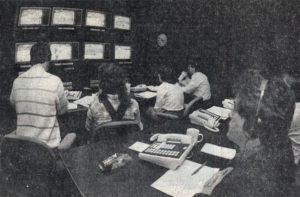
Another unique business technique was pioneered when Raycom established a central monitoring system within the company headquarters.(25) Employees documented each commercial and the time it was aired. They also communicated with each station’s control room during the game to ensure that the game was being telecast completely with all commercials airing. The following day, advertisers would know the number of commercials and the markets in which they had aired during a respective game. This facilitated billing.
Raycom developed a customized “traffic” system that placed commercials into program and production logs that guaranteed advertisers separation from competitive commercials and assured that the commercial was aired in a different game location in each telecast. The system handled hundreds of games each season and as many as 14 games on a single weekend.
Raycom’s growth was based on the philosophy that local teams playing on local television stations would generate larger audiences than other “out of market” teams.(26) The plan was to establish several regional networks, each televising local interest games.(27) Once established, regional advertisers could show their commercials to just their own region, a group of regions, or a national advertiser could purchase all the regions at one time. The result was higher ratings for both the regional and national advertisers.(28) Raycom’s syndicated network of games often garnered higher ratings than many of the most popular nationally-syndicated shows.(29)
Raycom used this approach when it secured its first college football rights from Clemson University in 1983. While the NCAA had sanctioned Clemson from having live telecasts of its football games, Raycom ran tape delay broadcasts in syndication and also on ESPN.(30)
The Supreme Court in June, 1984, ruled in favor of a lawsuit brought by the University of Oklahoma and the University of Georgia against the NCAA. The court said the NCAA control over television was a violation of antitrust law. Thus, college football television was no longer within the exclusive domain of the NCAA which had resulted in many games being televised exclusively on ABC.(31) Immediately, Raycom reached an agreement with the Southwest Conference to televise an exclusive regional package of football games (1984-1995).(32) Raycom, with support from Capitol Broadcasting, had previously reached a deal with the ACC for a football package,(33) but it was ultimately awarded to Jefferson-Pilot.

Two years later, Raycom acquired exclusive rights to regional football games of the Big Eight Conference (1985-1993).(34)(35) And in June, 1985, Raycom purchased all the sports rights to Katz Sports from Katz Communications, including the Kickoff Classic and Big Eight basketball.(36)
By 1988, fewer than ten years after the company was founded, Raycom was producing more than 400-500 events a year(37) and was the dominant regional television sports network for college basketball and football.(38)(39) In addition to the ACC, Southwest(40) and Big Eight,(41) the company held the television rights to the Pac-10 (1987-1995), PCAA (1985-1987) and Metro Conference (1985-1995).(42) Raycom also secured rights to the Big Ten (1989-1995) through its acquisition of Rasmussen Communications Management.(43)
During this period, the rights fees to these conferences paid by Raycom, with the exception of the ACC, ranged from initial revenue sharing formulas to guaranteed annual fees ranging from $800,000 to $3.5 million, depending on the number of games and exclusivity of the package.

Working with the National Association of Collegiate Directors of Athletics (NACDA), pre-season football games, such as the Kickoff Classic (1985-1992)(44) and later the Disneyland Pigskin Classic (1990-1994),(45) were also televised by Raycom.(13)
In 1989, Raycom formed a joint venture with Prime Network (Liberty) to acquire and distribute programming through broadcast and cable television syndication.(46) This allowed cable distribution outside the respective SWC/Big 8 Conference footprint. Also in 1989 Raycom filed a lawsuit against the SWC and Sports Channel America, claiming that Sports Channel was engaging in “intentional interference” with the Raycom/SWC contract and the SWC was in “breach of contract” with its Raycom agreement.(47) The suit was settled out of court and Raycom continued to produce and distribute SWC games for another six years until the SWC and Big 8 formed the Big 12.
In 1995, Raycom signed a deal to produce and syndicate select University of Texas football and basketball games during the 1995-96 season.(48)
For each telecast, Raycom actively marketed to fans with print and electronic advertising to increase viewership of games. Raycom used both conference-specific and overall Raycom branding in its marketing efforts.
In addition to broadcasting, Raycom secured title sponsorships to both the Goodyear Pac-10 Basketball Tournament (1988, 1989) and the Phillips 66 Big 8 Basketball Tournament (1988-present). Known as the Phillips 66 Big 12 Basketball Tournament, this is currently the longest-running title sponsorship of any sporting event.(49)
Statewide radio networks were established by Raycom for Purdue University, the University of Iowa and the University of Illinois from 1988 through 1990.(50) Raycom had experience in operating radio networks when the company managed the Virginia Tech radio network from 1981-1983.(7)(51)
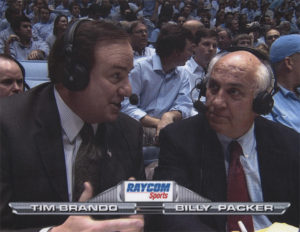
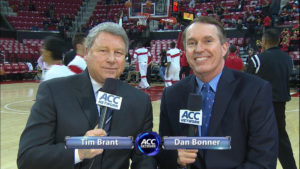
From a handful of employees in 1983, Raycom grew within six years to a full-time staff of more than 80 and opened offices in New York, Dallas, Chicago, Los Angeles(52) and Ft. Lauderdale. Many well-known sports commentators received their start or worked on Raycom telecasts, including Cory Alexander, Debbie Antonelli, Dave Archer, Dan Bonner, James Brown, Dave Barnett, Jay Bilas, Tim Brando, Tim Brant, Marty Brennaman, Larry Conley, Jack Corrigan, Charles Davis, Jimmy Dykes, Len Elmore, Larry Farmer, Ron Franklin, Terry Gannon, Mike Gminski, Tom Hammond, Kevin Harlan, Merle Harmon, Mike Hogewood, Keith Jackson, Craig James, Paul Kennedy, Kevin Kiley, Steve Martin, Mark May, Bob Neal, Dave Neal, Brad Nessler, Billy Packer, Mike Patrick, Bill Raftery, Bob Rathbun, Bill Rosinski, Dave Rowe, Roger Twibell, Jim Valvano, Dick Vermeil, Dick Vitale,(53) Bill Walton, Tom Werme, Fred White and Bud Wilkinson.
In addition to well-known announcers, many of Raycom’s top management were recognized as national leaders in college sports. College Sports magazine in 1994-95 recognized Rick Ray as the 8th and Chuck Steedman, director of programming, as the 27thmost influential people in college sports.(54) In 1992, The Sporting News had named Rick Ray as the 48th most-influential person in sports. In 2009 The Orlando Sentinel, in their series on the Most Powerful People in College Sports, named Ken Haines as the 4th most powerful in the Atlantic Coast Conference.(55)
Haines traveled extensively, during this period of accelerated growth, to colleges and conference offices arranging schedules and negotiating contracts with local television stations to carry games. Veteran station programmer Jim Duncan was hired in 1985 to assist Haines before retiring 13 years later. Pat LaPlatney(56) was hired in 1989 from the Blair television rep firm, and later was named head of Raycom programming and distribution. He was succeeded by Wil Allmendinger, hired from The Tribune Company in 1997.
In addition to sports programming, the company tried, with only limited success, to produce and syndicate entertainment programs domestically and internationally. Haines and LaPlatney made several trips to Europe, including Cannes, to try and place programming in the international marketplace.(57) Raycom prepared sales materials for shows in many different languages (Titanic) to tap the foreign markets (Elvis).
Raycom commanded high unit rates from its regional advertisers and sports revenue grew to over $60 million per year,(6) due in measure to the 1988 hiring of former VP of sales at ABC, Ray Warren. Spransy, who was hired in 1984, managed the sprawling financial assets of the company. In 1987, McGuire left to become head of sports production at Turner Broadcasting and another NBC veteran producer, Peter Rolfe,(17) was hired at Raycom. Later, Lynn Thorneburg of Thorlo, Inc. was hired in 1988 to oversee programming.
While Raycom was growing revenues, many sports syndication companies had committed to pay premium rights fees that far exceeded what advertising revenue could be generated. Companies such as Metrosports, TVS, Mizlou, Lorimar, Petry, Total Sports (TSN), Rasmussen Communications Management (RCM), Katz Sports, Sports Productions, Inc. (SPI), Bud Sports, Creative Sports (bought by ESPN) and eventually Jefferson Pilot (later bought by Raycom) all went out of business or were acquired.(58) Raycom eventually became the only remaining live sports syndication company.

The cornerstone of Raycom programming has always been ACC basketball. In its early history, ESPN relied heavily on the Raycom/JP package of ACC games to help it gain viewers. As cable became more popular during the 80′s, and ESPN became the national sports cable network, Raycom began supplying more of its basketball games to ESPN.
New to broadcasting was the practice of “blacking out” regions of the country from a telecast. However, since its inception ESPN has aired ACC games but blacked out the ACC region when the game was also being telecast on the Raycom/JP Network.(59)
ACC games were so popular within the ACC region, that many telecasts had ratings in the 20’s and 30′s.(60) The Virginia/UNC basketball game, featuring Michael Jordan and Ralph Sampson, did a 36 rating in Greensboro on February 10, 1983 and a 35 rating in Raleigh. The UNC/Georgia Tech game on February 4, 1986 did a 30 rating in Charlotte and a 31 rating in Raleigh. The UNC/Duke matchup always does high ratings including a 33 rating in Raleigh for the February 3, 1994 game and a 32 rating in Raleigh on February 1, 2001 and again on February 9, 2005.
Stations frequently would pre-empt the most popular network entertainment programs, since the ACC games would attract larger audiences. One of the most notable pre-emptions occurred on February 4, 1986 when #1 nationally-ranked UNC played #2 ranked Georgia Tech. The game was so popular that almost every Raycom network station from Washington, D.C. to Atlanta chose to pre-empt President Reagan’s State of the Union address that night to carry the game. Those stations ran the President’s address on tape delay following the game.(61)(62)
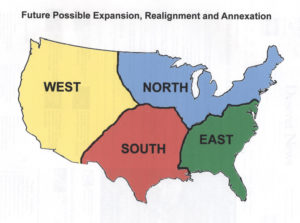
A forerunner to larger college conferences occurred in 1990(63) when Haines and Steedman(64) concluded a study for the establishment of a college “super conference.”(65)(66) It resulted in a major addition in membership to some college conferences and prompted a realignment(67) of the Metro Conference into Conference USA. The research(68) gained national attention and began a series of studies by all major college conferences on the benefits and liabilities of expansion.(69)(70)
The CBS television network by 1992 was rapidly becoming the only major over-the-air network that was broadcasting a significant number of college basketball games. NBC had dramatically reduced its schedule, and ABC had decided to exit the college basketball business. It was at this point that Raycom and ABC formed a unique business relationship(71)(72) whereby Raycom purchased all the available broadcast time for college basketball from ABC and programmed Raycom games on the ABC network.(73)(74) The block purchase of time was regarded as the largest ever to occur on a major network by an outside company. The arrangement proved so successful that during the 1995 season, the Raycom/ABC package of games generated higher ratings than the long-established CBS package.(75)
Raycom, to add interest to the ABC games, commissioned country music star Travis Tritt to do a special customized opening, “Whoop it up on the weekend,” for the ABC/ACC telecasts.(76) Sheet music was given to pep bands so they could play the opening at their games.
In 1992, Raycom syndicated a rematch of the Michigan-Duke national championship game. The national press speculated it could signal the start of national television syndication in regular season college basketball.(77)(78)(79)
Haines and Ed Hull, President of JP Sports, negotiated a new and expanded six-year contract between Raycom/JP Sports and the ACC in 1995 to provide coverage of non-conference men’s basketball games, women’s basketball games, baseball and championship events. The agreement provided coverage utilizing regional cable networks including Home Team Sports(HTS), FOX Sports South and the Sunshine Network.(80)
Also in 1995, Raycom and Liberty Sports of Dallas, TX, explored a merger that would have resulted in one of the largest media companies in the country.(81) The two companies ultimately couldn’t agree to terms, and the deal was abandoned.
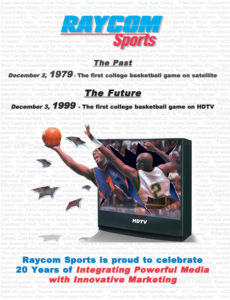
From past to present Raycom Sports has been visionary in its use of new production techniques. It was the first to use color billboards on all telecasts, the first to distribute games by means of satellite distribution and the first to employ “virtual signage” technology in college basketball and professional golf.(82) In a partnership with Capitol Broadcasting, on December 3, 1999 the company was the first to produce a college basketball game in high definition television (HDTV).(83) At the 2007 ACC Tournament in Tampa, Raycom produced the first syndicated sports programming in HD.(84)
In addition, Raycom was a pioneer with in-stadium instant replay, with producer Johnny Tyous providing video feeds from production trucks to JumboTron screens the company provided to such schools as Texas, Oklahoma State and Texas A&M.(85)
Raycom recognized the growing popularity of NASCAR and struck a deal to televise ten Grand National races in 1982.(86) When syndication logistics proved to be too difficult for stations, Raycom sold the rights to ESPN, marking ESPN’s entry into NASCAR.
In addition to many college telecasts, Raycom provided the production of pre-season telecasts of ten NFL teams,(87) including the Houston Oilers (1990-1994), Tennessee Titans (1998), Buffalo Bills (2000-2007), Washington Redskins (1999), Dallas Cowboys (1990-1991), Detroit Lions (1995), Kansas City Chiefs (1990), Minnesota Vikings (1994-1998), Arizona Cardinals (1999) and Carolina Panthers (1995-Present). Raycom also marketed and distributed Texas Rangers baseball games in 1996(88) and coordinated television production of the 2001 Miss Universe Pageant from Puerto Rico.

Raycom pioneered many other ventures in sports television, including the attempt in 1989 to stage the first major U.S. college football game in the Soviet Union,(89) the Glasnost Bowl.(90) Raycom secured the rights to match Southern Cal against the University of Illinois in a regular season game in Moscow.(91) Arrangements were made for a network telecast back to the United States and planes were chartered for fans to fly to Russia. Despite Haines and others spending weeks in Moscow, the Soviets were unable to supply the needed hotel rooms and the game was rescheduled for Los Angeles.(92)
Raycom also produced a number of videos(93) including a series on the ACC, North Carolina (“Blue Heaven”) and Duke (“Royal Blue”) basketball programs, the Florida-Georgia football rivalry(94) and highlights of football bowl games produced by the company. The True Value ACC Dream Team was released in April 1992,(95) a special Elvis Presley video was released in 1993 and a video of NBA star Muggsy Bogues was released in 1995.
Events
In 1986, Raycom Sports and longtime college athletic administrator Richard Giannini formed a joint venture called Raycom Management Group (RMG)(96) to manage sporting events. Giannini hired University of Florida Athletic Director Bill Carr as part of the RMG management team. RMG relied on Raycom’s television production experience to build a reputation for staging major sports events. When Giannini left Raycom in 1991, RMG was dissolved.
Terry Hanson, a former Turner Sports and PGA Tour executive, was hired in 1991 to oversee an events division within Raycom Sports,(97) which included the Blockbuster Bowl and the Diet Pepsi Tournament of Champions. In addition Mike Lude, former University of Washington Athletic Director, was hired during the same period to focus on the bowl game.
Beginning in 1994, Raycom, in conjunction with NACDA, has staged a unique party experience at the site of every NCAA Final Four.(98) The popular gatherings have been held at such unusual locations as a pirate ship in Tampa, a historic southern mansion in Charlotte, a racetrack in New Jersey, the State House and a 1920′s big band ballroom in Indianapolis, a remodeled train station in San Antonio, the Space Needle in Seattle, the Underground and the Georgia Aquarium in Atlanta, and the House of Blues in New Orleans.
Also in 1994, Raycom organized an all-female minor league baseball game in Charlotte featuring the Colorado Silver Bullets, managed by Phil Niekro. The game, televised on ESPN2, was played at Knight’s Castle. Raycom was instrumental in bringing several other sporting events to the city of Charlotte, including college football, basketball and LPGA golf.
Bowls
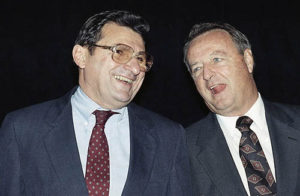
The Blockbuster Bowl(99)(100) (1990-1993), conceived by Giannini(101) was staged for 11 years from 1990 through 2000 in Joe Robbie Stadium, later renamed Pro Player Stadium. It was managed by Keith Tribble, former University of Florida Associate AD, for two years, then Brian Flajole, a former University of Washington athletic department employee, for five years, and longtime staff member Mitch Morrall for the last four years. Retitled the Carquest Bowl (1994-1997) and then the Micronpc.com Bowl (1998-2000), the game became a major bowl on CBS and later on TBS.(102)
The first game in 1990 was memorable in that it pitted FSU’s Bobby Bowden against Penn State’s Joe Paterno, two of the winningest coaches in college football.(103)(104) The 1993 game between Penn State and Stanford was also memorable in that Penn State’s Paterno agreed to play in the game, for the second time, before the season had even started. It was the earliest school-specific bowl agreement in NCAA history.(105) At that time, Penn State was not in the Big Ten and had no guaranteed bowl berth.
In 1996, the Carolina Panthers opened Bank of America Stadium (then Ericsson Stadium) in Charlotte and Raycom staged the first college football game in the new stadium.(7)(106) It pitted North Carolina State University and East Carolina University in a sold-out stadium.(107) That was followed by games between the University of North Carolina and NC State in 1998 and 1999,(108) and a second NC State vs. ECU game in 2004. In 2006, Raycom staged the Clemson vs. Temple football game, and managed the Virginia Tech vs. ECU game in 2008 and the ECU vs. South Carolina game in 2011. The games were overseen by long-term employee, George Johnson, who had been hired in 1992 in the programming and event division.
In 1996, Raycom purchased the rights to the regular season game between FSU and Maryland and moved it from College Park, Md. to Miami’s Pro Player Stadium.(109)
In 2002, Haines had a vision and plan for Raycom Sports to begin a new bowl game in Charlotte, the Continental Tire Bowl.(110)The game was scheduled to be sanctioned by the NCAA on September 11, 2001. Haines had flown to Philadelphia that morning to meet with the NCAA, but minutes before the meeting was to begin, the attack on the World Trade Center occurred and it was seven months later before the game was officially certified.(111)(112)
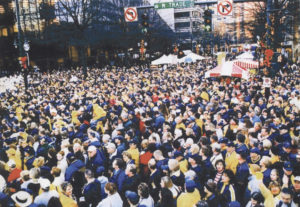
The game, featuring teams from the ACC and the Big East, was an unparalleled success.(113)(114) A sellout crowd of 73,535 witnessed the #2 teams in the ACC and Big East renew a border war as Virginia defeated West Virginia.(115) The game became one of the hottest tickets of the bowl season(116) and an uptown pep rally staged the night before the game brought an estimated 45,000 fans to the Trade & Tryon intersection in Charlotte. The Continental Tire Bowl also rated as the second-most viewed program on ESPN2 in 2002. The game was so successful(117)(118) it established a new Bank of America Stadium attendance record and was the second-most successful first-year bowl game in history, ranking only behind Raycom’s inaugural 1990 Blockbuster Bowl between Penn State and Florida State.
In addition, the game garnered national news when the Virginia Pep Band unflatteringly mocked West Virginia during its halftime performance.(119) The episode resulted in the abolishment of the pep band and establishment of a sanctioned University of Virginia marching band.
The Sports Business Journal named the game one of the five best start-ups in sports over the past five years(120) along with the NFL Houston Texans and ESPN the Magazine. It sold out two of the first three years.(121) Haines turned the Executive Director role over to Will Webb, a longtime successful Charlotte businessman. In January 2005, a new title sponsor was signed and the game was renamed the Meineke Car Care Bowl.(122) In 2011, the game was renamed the Belk Bowl.(123)
The game has featured such teams as North Carolina, Boston College, Clemson, Louisville, Duke, Cincinnati, Wake Forest, Virginia, Pittsburgh, NC State, West Virginia, Connecticut, South Florida and the United States Naval Academy.
Raycom also played a major role in Charlotte being awarded the bid for the ACC Football Championship Game in 2010 and 2011.(124) The championship game and the bowl game are currently owned by a non-profit entity, with Raycom involved in operational aspects of both games.(125)
College Basketball
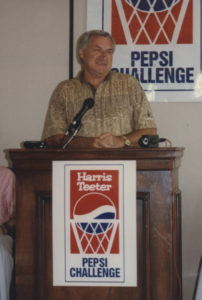
The Diet Pepsi Tournament of Champions,(126) later titled by Harris Teeter,(127) Food Lion(128) and Hardee’s, became one of the premier pre-season basketball tournaments.(129) The Charlotte tournament was staged for 14 consecutive years, from 1988 through 2001, the last few years under the supervision of Johnson.
Matching the previous season’s top eight basketball teams was a concept that became reality with the 1994 establishment of the DIRECTV Great Eight.(130) The Detroit, and later, Chicago event was staged by Raycom and ESPN.(131) The Great Eight enjoyed a successful run from 1994-1999, benefiting the CHAMPS/Life Skills program, before the NCAA chose to eliminate tournament exemptions, thus forcing the end of the event.(132)
The Franklin National Bank Classic, later renamed the BB&T Classic, in Washington, DC and hosted by Maryland and George Washington was marketed and telecast by Raycom from its inception in 1995 through 2004.(133) These types of events provided the company with the ability to integrate event marketing and television exposure.
Raycom organized a second basketball tournament in Charlotte in 1996, The Naismith Classic, which was played for one year.
Golf
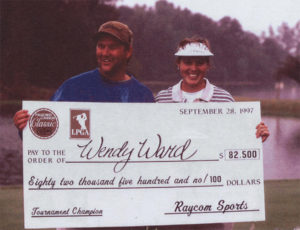
In 1997, a company (Del Wilbur) that was managing and operating an LPGA golf tournament in Charlotte, the Fieldcrest Cannon Classic, filed for bankruptcy.(134) It was three weeks before the start of the tournament at the Peninsula Club at Lake Norman. Facing the prospect of the scheduled local event being cancelled on short notice, Haines assembled the entire Charlotte staff and Raycom stepped in and successfully staged the tournament, with only three weeks planning. The LPGA official tournament report gave the event a near perfect score.
As a result of the success of the Charlotte LPGA event, Raycom was able to add two LPGA golf tournaments, the Longs Drug Challenge(135) (1998-2008) in Sacramento and later San Francisco, and the Mitchell Company Tournament of Champions(136) (1998-2007) in Auburn/Opelika, Alabama and later Mobile.
Beginning in 2005, the Mitchell Company Tournament of Champions added Kathy Ireland Worldwide as the presenting sponsor.(137) And in 2006, the Longs Drugs Challenge moved to Blackhawk Country Club, near San Francisco.
Fully-staffed offices were opened by Raycom in Sacramento, Nashville and Mobile. Bowl director Brian Flajole was promoted to Vice-President of Golf and relocated from his position in Ft. Lauderdale to head the newly formed golf operations division in Sacramento in 1997. In a short period of time, Flajole negotiated to have Raycom hired by the Sacramento Sports Commission to handle sales and marketing for the U.S. Track & Field Trials in 2000, and again in 2004.(138)
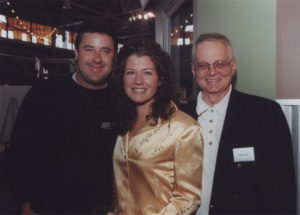
In Nashville, the Electrolux USA Championship hosted by Vince Gill and Amy Grant was added in 2000(139)(140) and was staged for three years initially under the Raycom leadership of LPGA veteran director Clyde Russell and later Steve Nieman.(141) In 2002, Raycom and former Alabama All-American and NFL All-Pro Cornelius Bennett started a golf outing to raise money for local charities, the McDonald’s Cornelius Bennett Celebrity Golf Classic, which took place for three years.
Sports and Entertainment Programming
Raycom utilized its sales, distribution and production resources to telecast and produce a number of sports and entertainment specials including the Dove Entertainment Awards (1987), Elvis’ Graceland Special(142) (1987,1988), the Emmy Awards for Sports(143)(144)(145) (1988,1989), The Making of “It’s A Wonderful Life” (1991), the Naismith Awards (1992-1998), Lone Stars(146) (1992), America Comes to Graceland (1993), Elvis: His Life and Times(147) (1993,1995,1997), Off the Record with Pat Summerall (1994), Elvis, Touch the Dream, a New Generation (1995), Ford Supermodel of the World(148) (1995), Holidays at Home(149) (1995), SI 40th Anniversary “Forty For the Ages” (1994), The Making of the SI Swimsuit Issue(150) (1994,1995), SI, The Year in Sports (1995), Beauty Reigns in Spain (1995), Journey of the African-American Athlete (1997), Don’t Tell Me No (1995), New Year’s Eve Coast to Coast(151) (1995), ThunderDome Shootout (1995), Racing Home(152) (1995), The Wendy’s Classic (1996), Southern Living Holiday to Remember (1997), NASCAR Think Fast! (1998), BASSMasters Classic(153) (1998), AVP pro beach volleyball (1999), Golf 2000 with Peter Jacobsen (1999), The Sports Edge with Rudy Martzke (1999), MLB ’99: A Season of Heroes (2000), Get Golf (2000), Tiger Woods Charity golf (2002-2003), The Ladies First Celebrity Golf Classic (2006), New Year’s Eve Peach Drop (2002-2005) and Citrus Bowl Parade (2002-2004).
In addition, Raycom produced and televised several college and pro coaches and administrators shows for North Carolina’s John Swofford (1979-81), Virginia Tech’s Bill Dooley (1981-83), Illinois’ John Mackovic and Lou Henson (1988-1991), Purdue’s Fred Akers and Gene Keady (1988-1989), Iowa’s Hayden Fry and Tom Davis (1989-1993), and Houston Oilers’ Jack Pardee (1990-1994).
More Than A Game
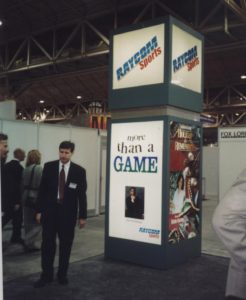
From 1997 through 2001, Raycom also syndicated a nationally acclaimed sports program, “More Than A Game,”(154) featuring positive stories from the sports world. The show was hosted by Fred Hickman and Janet Evans, and later Brandi Chastain. In 1999, Raycom hosted a World Series promotion, looking for a story exemplifying sportsmanship. Jason Duncan, a seventh grader from Ft. Lauderdale, Fla. caught Mark McGwire’s 56th home run ball and gave it back in return for a few autographed items. He then donated one of the items to a local children’s shelter auction. Raycom sent Duncan on an all-expense paid trip to Game 1 of the 1999 World Series featuring the New York Yankees visiting the Atlanta Braves.
Elvis Specials
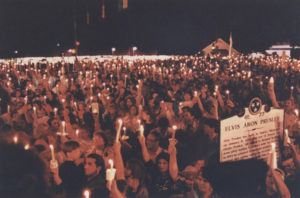
While the company began concentrating more on its core sports programming, Raycom maintained an exclusive contract with the Estate of Elvis Presley(155) (1987-1997). Haines became very close to the administrators of the Estate and as a result, Raycom syndicated a number of specials on the life of Elvis Presley. The first special, “Elvis’ Graceland”(1987), was distributed to nearly every television market in the United States and delivered an outstanding 7.2 rating over 93% of the country.(142)
Following the initial success of the first Elvis special, the company produced more specials to coincide with the August 26th events in Memphis surrounding the anniversary of Elvis’ death. Raycom hired such stars as Travis Tritt, Lisa Hartman and Mac Davis to host the specials. New York producer Cary Glotzer was in charge of production and the programs were distributed nationally during Elvis Tribute week. On the eve of the 20th anniversary of Elvis’ death, Raycom fed exclusive footage of the candlelight vigil to a special telecast airing nationally on VH-1.
Unsuccessful Entertainment Programming
Raycom was unsuccessful in several entertainment ventures. This included production and distribution of such shows as Ushuaia(156), The RFK Assassination(157), Slam Sports, Fish the Carolinas with Ty Mathis, Power Pro Wrestling, Sporting News TV, Missing Without A Trace, ACC Kids, John-Boy and Billy TV Specials, Killers at the Box Office, Night Creatures, Lords of Hollywood, The Innocent of Hollywood(158) and The Titanic.(159)
Sales and Marketing
Re-focusing of the company into event marketing and sports was accelerated in 1993 when the Fox network outbid CBS to acquire rights to the NFL.(160) That single negotiation elevated the fees for all sports rights and opened a renegotiation of station and network contracts that resulted in many television station affiliation switches. Raycom capitalized upon the dramatic changes in the marketplace and used the opportunity to reduce its risk in a heightened sports rights marketplace. Concurrently, the company dramatically increased its role in providing marketing services to effectively maximize sports properties, starting a consulting division.(161)
The company found greater success in the sports arena than in entertainment shows. Increased emphasis was placed on sports marketing and packaging.

Indicative of the company’s change in focus was the fact that Raycom represented, sold advertising and, in many instances, found distribution outlets (stations and networks) for a number of major sports properties. In 1995, Raycom sold the title to the Tostitos Fiesta Bowl in what many considered, at that time, to be the most expensive title to a college football game ever sold.(162) In 2002, veteran salesman Jim Brannon sold Mazda the title to the Tangerine Bowl, and Continental Tire the title to the bowl game in Charlotte. In 2005, he then secured Meineke Car Care Centers as the title for the Charlotte bowl.
In addition, the company has represented the marketing/advertising rights to prestigious football games including the Cotton Bowl (1995), the Toyota Gator Bowl (1995-1996), the Liberty Bowl (1985-1989), the Freedom Bowl (1989-1994),(163) the All-American Bowl (1987), The Bluebonnet Bowl (1986), the Holiday Bowl (1985) and the Tangerine Bowl (2002-2003). Raycom also represented properties such as the Big 12 Conference, the Pac-10, the Southeastern Conference, the ACC, and the National Association of Intercollegiate Athletics(NAIA).(164) Raycom coordinated advertising sales for the Raycom Baseball Network,(165) and represented the entire sports schedule of Sports News Satellite, a company that provided sports highlights to all NBC network affiliates. Raycom also was hired to seek sponsorships for Tony Stewart’s Ranier/Walsh racing team in 1996.
ACC Properties
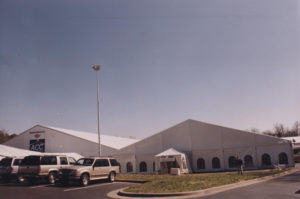
The company teamed with the ACC in 1994 to establish ACC Properties.(166) Managed by Raycom, the venture was regarded as the forerunner and model for future college sports marketing strategies with a core foundation of corporate partners. ACC Properties controls all marketing, internet, merchandising, promotion and licensing rights to ACC sports.(167) In addition to having exclusive rights, each corporate partner is a major television sponsor on ACC sports telecasts.
The ACC Corporate Partner Program, now known as the ACC Corporate Champions Program, includes ACC FanFest (formerly ACC Fan Fair), the public events and exhibitions component of ACC men’s & women’s basketball tournaments and the ACC Football Championship game. Corporate Champions have heavy activation during these events.
Many companies have been or were part of the ACC Corporate Partner Program for more than a decade. Some of these companies include Food Lion, Pepsi, Geico, Chrysler, RBC Bank, Gatorade, AT&T and Toyota.(3)
Raycom, JP Sports and The ACC
Haines and JP’s Hull in late 1999 worked with ACC Commissioner John Swofford in negotiating a renewal to the prestigious ACC basketball television contract. As a result, Raycom Sports and partner Jefferson-Pilot Sports extended their contract with the ACC for all basketball television and conference marketing rights through the 2010-2011 season.(167)
The new package dissolved a cable exclusivity of ESPN and introduced a unique nationally-televised Sunday night game of the week on FOX Sports Net,(168) while maintaining ACC games on ESPN, ABC, CBS, and the traditional Raycom syndicated package.(169) All scheduling of ACC basketball games on any network was coordinated by Johnson, who worked closely with the ACC. Raycom continued to also handle marketing, sales, and distribution while Jefferson-Pilot oversaw production of the ACC package of games.
The financial package committed more than $300 million to the ACC over a ten-year period(167) and continued the conference’s record of being the most televised college basketball conference in the nation. It gave the ACC the highest rights fee per school of any of the 31 leagues in Division I.(170) The agreement between Raycom and the ACC marked 30 years that Raycom had been a television partner with the ACC. It also signified 30 years of a successful business relationship with Jefferson Pilot.
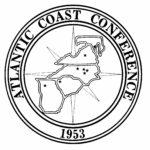
That successful relationship was strengthened again after the ACC announced that it was expanding and adding Virginia Tech and Miami, and later Boston College.(171) The new teams helped cement the ACC as a national football power.
The ACC football syndication rights were held by Jefferson-Pilot Sports since 1984. In looking to renew those rights, it became obvious to both JP Sports and Raycom Sports that expanding their partnership was the next logical step. By using their basketball rights with new syndication football rights, Raycom/JP Sports could maximize marketing and distribution for both at the same time.
On Monday, April 19, 2004, Raycom Sports and Jefferson-Pilot Sports made a joint presentation to the ACC,(172) which would secure football syndication rights as well as increase the basketball rights fee under the existing contract, for a combined $6 million increase. Despite bids by many other sports networks, and as a testament to the strong relationship with the ACC, Raycom/JP Sports was awarded the football syndication rights. As a result, Raycom Sports and Jefferson-Pilot Sports held the full ACC men’s basketball television rights and syndicated football rights through 2010-2011 for a reported $36 million per year.(173)
Prior to 2010 a major shift occurred in the economics of college television rights. Starting in 2007 the Big Ten Conference launched its own “Big Ten Network”(174) and five years later the PAC 12 followed suit. And in 2013, the SEC concluded a landmark network deal with ESPN.(175) Traditional advertising dollars could no longer support the high rights fees that colleges and conferences were charging for televising their games. It was apparent that subscriber cable fees would now be the main revenue source in funding the escalating television fees.
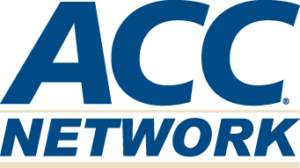
Realizing this change in the TV sports landscape,(176) during the 2009 NCAA Final Four in Detroit, Ken Haines met with several cable network executives to discuss a combination bid for extending ACC television rights. Following 15 months of negotiations and meetings, Raycom, ESPN and the ACC made an announcement on June 8, 2010 that through a sublicense arrangement with ESPN, Raycom would continue its long-standing position as the syndication home of Atlantic Coast Conference content for over-the-air and regional cable network distribution. In addition, the syndicated Raycom ACC telecasts would become part of a branded “The ACC Network.”(177)
Unprecedented in length for Raycom, the 12-year deal with ESPN covered the 2011-2012 through 2022-2023 seasons and was reported to be $1.86 billion to the conference over the term.(178) More importantly, it provided that Raycom would continue to oversee the ACC’s official corporate partner program, ACC Corporate Champions. Raycom would also continue to manage the conferences’ digital assets, all mobile platforms and theacc.com, the official conference web site.
The ACC Network was established in 2010 by Raycom Sports and the ACC following the founding of the Big Ten Network and prior to the launching of the PAC-12 Network and SEC Network. The ACC Network uses broadcast stations, cable distribution and digital media to disseminate its branded “Network” products. The Big Ten, Pac-12 and SEC do not use broadcast television stations but have a dedicated cable channel and digital mediums. The ACC Network, produced by Raycom Sports, reached 84% of the U.S. in 2014.
The new agreement lasted for only one season as the ACC announced in 2012 the additions of the University of Pittsburgh and Syracuse University beginning in 2013.(179) This forced the negotiation of a new 15-year ESPN agreement that was reported to be $3.6 billion over the term.(180) The new agreement included full members Pittsburgh and Syracuse. Haines again successfully negotiated with ESPN and FOX amendments to existing Raycom contracts that added the additional schools(181) and ensured Raycom coverage of the ACC through the 2026-2027 seasons.
In September of 2012, the ACC added Notre Dame in all sports except football. And in November, Maryland accepted membership into the Big Ten, followed shortly by the ACC announcing that Louisville would become its newest member. This again resulted in a renegotiated ACC television contract, reported to be worth $4.2 billion over 14 years, or $20 million per year to each school.(182)
The amended agreements continued syndication of ACC games nationally, included all previous digital rights and continued management of the ACC Corporate Champions program. In addition, it allows for an expanded package of regional cable games that Raycom sub-licenses to FOX Sports South.
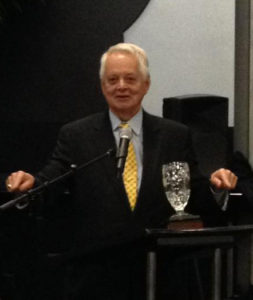
Television rights fees to conferences increased at a staggering rate from 2009 to 2012. Raycom’s Haines in 2013 delivered a lecture(183) to a graduate class of broadcasting students at Elon University in Elon, N.C. in which he made the following opening statement regarding the reasons for the spectacular increase in television sports rights fees:
“In the span of 30 years, the television rights to the ACC have increased from $1 million to approaching $250 million per year. Given that most of the major conferences have added membership to expand their geographic footprint, all major conferences have seen dramatic increases in rights as the value of live televised sports have become recognized by networks, especially ESPN and FOX. The economics of television have changed with most of the population getting their television programming from cable and satellite providers. The cable or satellite provider collects fees from each TV household. The sports rights holders are paid a portion of these fees collected by each provider. This guaranteed revenue allows the rights holder to pay significantly more money to colleges and athletic conferences.
“Another factor that increased the value of sports rights was the fact that live games were viewed by advertisers as “record proof” since viewers wanted to watch the games live which assured that commercials would be seen and not skipped through as is the case with many recorded entertainment programs that are viewed later in the day or week.
“In addition, advancements in technology have also played a major role when digital platforms enabled sports events to be seen on everything from computers to tablets to phones. This has increased the value to rights holders, and subsequently, to colleges and conferences.
“Finally, with the addition of high definition television pictures, coupled with higher ticket prices for attending games, the experience of viewing a game on TV or on a digital device can be more entertaining and cost effective than attending the game in person.
“At sometime in the near future technology may allow colleges and conferences to televise all their sports events directly to their fans, bypassing all third party providers and networks. The colleges and conferences would then be able to retain almost all the revenue from the viewer.”
JP Sports
Jefferson-Pilot Sports and its parent company, on April 1, 2006, were merged into Lincoln Financial Group and Jefferson-Pilot Sports was renamed Lincoln Financial Sports (LFS). Then on November 30, 2007, Raycom Media purchased Lincoln Financial Sports and the company became part of Raycom Sports.(184) The purchase brought additional resources to Raycom in personnel and production facilities.(185)
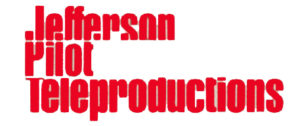
The 26-year history of JP Sports/ LF Sports includes the production, marketing and distribution of Southeastern Conference basketball from 1986-2008 and football from 1992-2008. In addition, the company’s production facilities have been used for nearly 300 events each year.(186)
The company established in 1986 a network of stations and produced the NASCAR Winston Cup races from Charlotte (1986-1987) and the World 600 (1986-1987). The Charlotte Carousel Parade (since 1983), the NBA Charlotte Hornets (1988-2002), the NFL Carolina Panthers preseason games (since 1995), the NHL Carolina Hurricanes (1997-2008), the Charlotte Criterion Bicycle Race (2004-2009), and Charlotte First Night (since 2008) utilized JP production services.
JP Sports, and its predecessor Jefferson-Pilot Teleproductions, also had a history in producing and marketing such events as The Great American Independent Football Package (1987-1990), which was a precursor to the Big East Football Conference, the North Carolina-South Carolina High School Football Shrine Bowl (1987-1990) and college football shows including Football Saturdays in the South (since 2004). Made for TV shows became a staple of JP Sports and have included such programs as the Southern Sports Awards(187) (2005-2006), Beach Country Christmas (1996) and Olympic programming in ice skating, gymnastics and basketball.
As the U.S. prepared to host the Summer Olympics in 1996, JP Sports produced Olympic programming from 1994 through 1996, including the U.S. Olympic Festival on Ice, the John Hancock Gymnastics Tour, Riders Skating Tour, the John Hancock Rock’n’Roll Figure Skating Championship, Too Hot to Skate, Skater X 2, Rock’n’Roll on Ice, Christmas on Ice and Champagne on Ice.
JP Sports conceived and produced Road to U.S. Olympic Gold (1995-1996), Ice Wars (1990-1996) and pre-Olympic basketball (1988). The company sponsored, produced and syndicated the Carolinas Invitational (1988), which was a pre-Olympic exhibition in basketball, swimming, cycling, baseball and boxing, and in partnership with NBC and USA Network, distributed the Tour de Trump (1988-1989).
Digital Media and New Ventures
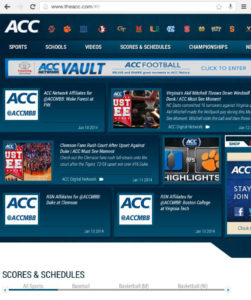
Raycom Sports took the ACC Tournament online in 1995, as it partnered with the Greensboro News & Record to host live updates from the tournament with “The ACC Tournament: Wired.” This was believed to be the first college sporting event represented live on the internet.(188)
In conjunction with Turner Sports New Media, in September 2006, Raycom began programming accselect.com,(189) a broadband-based live streaming internet network. The venture featured live streaming of ACC Olympic-type sporting events. Over 1,000 events were produced the first two years of the service. In 2008, Raycom teamed with Jacked, Inc. to provide an interactive web initiative to integrate the web with the Raycom game telecasts.
In 2010, Raycom began a unique digital service(190) on the official ACC web site which is managed by Raycom. The service named “The Vault”(191) allows users to access old games, highlights and bundled facts and characteristics on players and games from the extensive Raycom and ACC libraries.
Also in 2010, Raycom began providing an iPhone and iPad app, and later a Droid and Windows app, to mobile ACC users featuring immediate access to live streaming games, highlights, detailed scoreboards, wireless alerts and other features.(192)
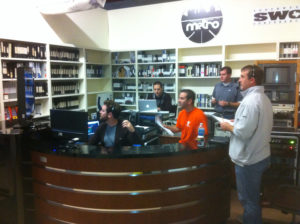
In 2011, Raycom entered into an agreement with Silver Chalice to establish an ACC Digital Network(193) that would provide ACC programming to numerous digital platforms. It is accessible 24 hours a day, 7 days a week, and contains a menu of news, information, analysis, features, videos and live programming about the ACC and its teams. A studio and edit suites were built in the Raycom Sports’ building. The ACC Digital Network(194) is managed by Chad Swofford, who was hired in 2007 from the Boston College athletic department.
In the fall of 2011, Raycom began telecasting a live college football pregame and halftime studio show, “ACC Blitz,”(195) with live game updates and cut-ins to other ACC games. The show was hosted by Danielle Trotta and now Tom Werme, with former Clemson football coach Tommy Bowden.
Raycom launched the first conference gaming app in 2013, the ACC Football Challenge.(196) The app let fans compete as their favorite school and play its full 2013 ACC football schedule. Additionally, the game features real-time head-to-head match-ups and allow fans to challenge and post scores on Facebook and Twitter, all the while keeping track of overall performance on conference and school-specific leaderboards.
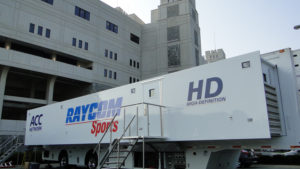
Raycom maintains two fully-equipped state-of-the-art High Definition production trucks(197) that were put into service in August of 2011 and 2013. The trucks are frequently used by national and regional networks to produce live events. Also, Raycom has satellite services, uplink facilities and extensive HD editing capabilities.
Raycom Ownership
While playing tennis together at Hilton Head, S.C., Rick Ray and fellow Hilton Head resident Bert Ellis often talked about the changes in the broadcast industry. Ellis owned Ellis Communications and was looking to expand his broadcast holdings and properties. Ray was interested in finding a situation that would bring more capital and synergy to Raycom.(198) On April 12, 1994 Ellis Communications purchased Raycom(199) and a new era began. Raycom Sports had become a nationally recognized brand, and in the process had become very visible in the Charlotte community.
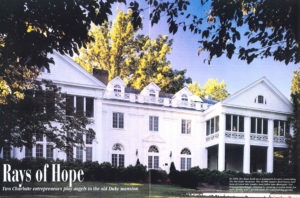
In 1989, the Rays purchased the spacious Duke Mansion,(99) also known as “White Oaks.”(6) Dee and Rick Ray retired from Raycom in 1994(200) and 1995(201), respectively. They sold the Duke Mansion in 1996.
The company was sold again on September 12, 1996 when Ellis sold his holdings to a media group funded by the Retirement Systems of Alabama.(202) The pension fund provided funding to acquire numerous radio and television stations and, based on the national visibility and reputation of the Raycom Sports name, chose Raycom Media as the name of its new corporate entity.(203)(204)
Raycom Sports, with over 70 employees, became a division of Raycom Media of Montgomery, Alabama. John Hayes was the first CEO of the newly formed company and was succeeded in 2001 by Paul McTear.(205)(206) In addition to having oversight of Raycom Sports, McTear, a former Providence Journal company executive, manages the 53 Raycom Media television stations that comprise over 12.6% of the U.S. television marketplace. McTear was inducted into the Broadcasting and Cable Hall of Fame in 2007. In 2011, Pat LaPlatney, a former Raycom Sports employee who now works for Raycom Media, took over corporate responsibilities for Raycom Sports.
On December 16, 2011, Raycom acquired Tupelo-Honey, a leading sports and entertainment company based in New York City.(207) Combined with Raycom Sports, the acquisition provided additional production and programming for Raycom Sports, including major league soccer and arena football. Tupelo-Honey is headed by Cary Glotzer, who worked with Raycom on several Elvis entertainment projects in the 1990′s.
Raycom Sports Management
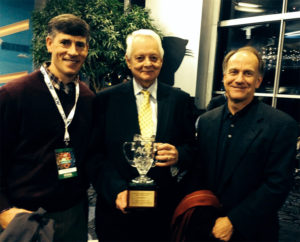
Raycom Sports is managed by President & Chief Executive Officer Ken Haines,(13) who has been with the company since its inception.(121) Prior to 2003, Raycom’s President & CEO was Ray Warren, who served in that capacity from 1995 to November, 2002.(208) The senior management at the company is one of the most tenured in the business.
Following the purchase of Lincoln Financial Sports,(209)(210) Raycom retained key management, including Executive Vice President Ed Hull, who had been Jefferson-Pilot Sports President since 1984 (Hull retired in May, 2008), Jimmy Rayburn, VP of production since 1986, and Rob Reichley, coordinating producer since 1993. In 2012, Jimmy Rayburn was promoted to Chief Operating Officer(211) of the company under Haines and Reichley was named Executive Producer. Other key personnel included Charles Moye, operations director since 1984 and Becky Smith, finance director since 1985, who was promoted to controller in 2012. Roger Roebuck continued in distribution and production. He had been at JP Sports since 1988 (Roebuck retired in 2009).
Distribution and digital multimedia were handled by Colin Smith, hired in 1995 and served as Vice President of New Media until 2012, when he left to become Managing Director of Digital Platforms at NASCAR. Chad Swofford took over new media and was named Senior Director of New Media & Business Development. Station syndication is managed by George Johnson, who also oversees event operations. Ad sales and marketing is under the leadership of Jeff Tennant while media relations and communications are headed by Frank Kay, who has been with the company since 1998.
Raycom Sports prides itself on stability and experience. Those employees who have served the company for more than 20 years include Ken Haines, Jimmy Rayburn, George Johnson, Peter Rolfe, Jim Brannon, Jim Ford, Charles Moye, Kathy Fretz, Becky Smith, Laura Rhyne, Rob Reichley and Kelly Kent.
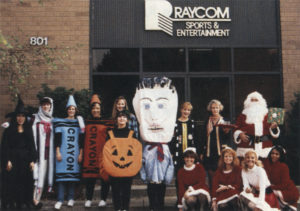
Raycom has been housed in seven locations in Charlotte since 1979.(212) It was initially located on Park Road, near the Park Road Shopping Center and then on E. Morehead Street. In 1982, the company moved to Rexford Road, near The Shops at South Park. From 1985-1992, the headquarters were on Trade Street, near the county courthouse. In 1992, the company operated from a spacious facility on East Boulevard in the Dilworth section of the city.(213) Raycom relocated to a new building complex near the Charlotte Coliseum in 1998.(214) With the purchase of LFS (Jefferson-Pilot Sports), Raycom moved in 2008 to a complex on Morehead Street across from WBTV, also owned by Raycom Media.
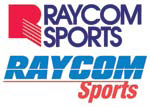
The Charlotte based company, has provided employment to over 500 employees and hundreds of freelance employees. It is not only the oldest, but also the only remaining regional television sports syndication company in the nation.(215) Every Raycom event designates a local charity to be a recipient of funds.(216)(217)
Several different Raycom Sports logos and Jefferson Pilot logos have become familiar on television sports broadcasts over the long history of both companies.
Raycom Sports uses the slogan of “integrating powerful media with innovative marketing.” The company has been widely acknowledged as being a visionary that is at the forefront or ahead of the curve in the business of collegiate sports.(218)
Raycom Sports Event Results with program material (LPGA, college basketball, college football)
Printable Format of Raycom Sports History
(The Index and the Footnote Source Index both correspond to the page numbers in the hard copy book.)
Footnote Source Index from Published Book
FOOTNOTES
1 ACC Basketball, An Illustrated History, Ron Morris, 1988, p. 122
2 Golden Glory: The First 50 Years of the ACC, Barry Jacobs, 2002, p. 166 (Tim Peeler)
3 “Through Parts of Seven Decades, From C.D. Chesley to Raycom Sports…,” ACC Sports Journal, Spring 2013, Daniel Haygood
4 “Raycom’s Rick Ray: The best laid plans sometimes work out,” Broadcasting Magazine, March 28, 1988
5 “Ray’s Alaskan adventure led to Raycom Sports TV Boom,” Charlotte Observer, 1984, Dan Lohwasser
6 “The Long Shot,” Business, North Carolina, June, 1992, Kathy Payton
7 “Kings of the Court,” Charlotte’s Best Magazine, February 1998, Stan Sisk and Renee Wright
8 “Channel 18 Keeps Basketball,” Charlotte Observer, January 9, 1980
9 “ACC TV pact includes more sports, programs,” Charlotte News, May 24, 1982, Leonard Laye
10 “The ACC Loves Raycom-nomics,” ACC Basketball Handbook, 1982-83, Leonard Laye
11 “Public Affairs chief leaving Virginia Tech,” Roanoke Times and World News, July 24, 1982, Charles Hite
12 “President Lavery laments a loss,” VT Spectrum, August 19, 1982
13 “Power Broker: Raycom official brings unique perspective to his job,” Greensboro News and Record, September 20, 1992, Wilt Browning
14 “Net Work; Twenty-five years ago, a new era in ACC television began,” ACC Tournament Program, 2007, Jerry Ratcliffe
15 “New Voices To Be Heard Around ACC,” Charlotte Observer, October 30, 1982, Mark Wolf
16 “Veteran producer to handle SWC basketball tournament,” Dallas Morning News, March 8, 1985, Cathy Harasta
17 “Behind The Scenes,” ACC Basketball Handbook, 1993-94, David Poole
18 “ACC Season Ticket Debuts on ESPN,” ACC Basketball Handbook, 1983-84
19 “The ACC on TV,” ACC Tournament program, 2005, Jack Bogaczyk
20 “Senate Amendment H. 2510,” South Carolina General Assembly
21 “Season Ticket,” Virginia Football Game Program, November 19, 1983
22 “ACC extends Raycom TV pact,” Greensboro Daily News, March 8, 1984, Tony Barnhart
23 “ACC Adds 4 Years to TV Pact,” Charlotte Observer, March 13, 1988, Stan Olson
24 “TV contract extended for men’s basketball,” ACC Week, November 7, 1994, Staff Report
25 “A Day in Basketball Central,” Charlotte Observer, February 1, 1987, Tom Sorensen
26 “College ball: Take a number,” Broadcasting, October 16, 1989
27 “Sports Barter, Holding Its Own,” Broadcasting, March 2, 1992, Peter Lambert
28 “Syndication: Local interest, national reach,” Broadcasting, October 16, 1989
29 “Raycom hopes good fortune continues,” Houston Post, September 13, 1985, Jay Frank
30 “Clemson TV Scheduled,” The State, July 14, 1983, AP
31 “ACC Awaiting TV Decision,” Charlotte Observer, June 17, 1983, Associated Press
32 “Raycom Gets Southwest Conference TV Deal,” Charlotte Observer, July 22, 1984
33 “Raycom Will Televise ACC Football Game of the Week,” Charlotte Observer, January 11, 1984, Mark Wolf
34 “College schedules: Prime Time venues,” Broadcasting, October 8, 1990, P.48, PWL
35 “Big 8 Business,” Dallas Morning News, April 5, 1985
36 “Raycom takes over Katz sports rights,” Broadcasting, June 17, 1985
37 “Raycom Now Nation’s Largest Programmer,” Diet Pepsi Tournament of Champions Official Program, December 2-3, 1988
38 “Major College Basketball Syndicators,” View, January 6, 1986, Gary Nager
39 “Raycom Survives, Thrives In Troubled Times,” Charlotte Observer, July 22, 1985, Dan Lohwasser
40 “SWC, Raycom Extend Deal for TV Syndication,” Amusement Business, March 5, 1995
41 “Around the Dial,” Houston Chronicle, October 20, 1985, Eddie Sefko
42 “College Basketball TV Analysis,” Sports Inc., November 28, 1988, Keith Dunnavant
43 “Raycom Announces Acquisition of RCM,” Raycom, October 31, 1988
44 “Classic kicks off college season,” USA Today, August 26, 1988, Rachel Shuster
45 “Pigskin Game Goes National : College football: NBC agrees to three-year deal to broadcast the bowl game from Anaheim Stadium,”
Los Angeles Times, May 3, 1990, Mike DiGiovanna
46 “Raycom Inc. and Prime Network Announce Joint Venture,” Raycom, 1989
47 “Raycom files suit against the SWC,” Dallas Morning News, August 14, 1989, Steve Richardson
48 “UT, Raycom Ink TV Deal,” Tyler Courier-Times, July 28, 1995, AP
49 “Phillips 66 tie to Big 12 hoops 25 years strong,” Sports Business Journal, March 5-11, 2012, Michael Smith
50 “Raycom a year older and a radio division larger,” Chicago Tribune, July 18, 1989, Steve Nidetz
51 “Virginia Tech Radio Network Among Nation’s Best,” Virginia Tech Football Media Guide, 1982
52 “Raycom Adds Los Angeles Office,” Business Wire, April 3, 1995
53 “Credit Raycom for bringing us Dick Vitale,” Charlotte Observer, January 1, 1996, David Mildenberg
54 “Most Influential People in College Sports,” College Sports Magazine, 1994-95
55 “ACC’s 10 Most Powerful,” Orlando Sentinel, July 9, 2009, Andrew Carter
56 “Hats off to 40 young leaders,” Charlotte Business Journal, May 27, 1996
57 “Haines, LaPlatney Explore International Markets,” Raycom Digest, January 1993
58 “Sports Now $100-Mil Barter Bonanza,” Variety, July 29, 1987, John Dempsey
59 “Dueling telecasts at ACC tournament,” Atlanta Journal-Constitution, March 10, 2012, Tim Tucker
60 “On air, ACC still strong,” Raleigh News and Observer, February 7, 1996, Caulton Tudor
61 “Basketball pre-empts president,” USA Today, February 5, 1986, Rachel Shuster
62 “ACC game shutting out Reagan’s speech on WBTV,” Charlotte Observer, February 1, 1986, Jeff Borden
63 “Lure of TV Loot Loosens Old College Ties,” Wall Street Journal, November 14, 1990, John Helyar
64 “His job stuff of hoops dreams,” Charlotte Observer, March 31, 1995, David Poole
65 “Super-league seems hard to resist, by-pass,” Dominion Post, June 29, 1990, Mitch Vingle
66 “Metro Conference seeks to expand to 16 teams,” USA Today, June 29, 1990, John Bannon
67 “Arkansas move to get ball rolling,” USA Today, July 31, 1990, Erik Brady
68 “16-team Metro studied,” Roanoke Times and World News, June 15, 1990, Scott Blanchard and Jack Bogaczyk
69 “History lesson: Super-Conference concept rooted in 1990 proposal,” Sports Business Journal, September 26-October 2, 2011, Michael Smith
70 “Football provides spark, money fans movement flame,” USA Today, August 16, 1990, John Bannon
71 “ABC, Raycom in college basketball deal,” USA Today, July 11, 1991
72 “ABC, Raycom team up,” Charlotte Observer, February 2, 1992, John Day
73 “Raycom sends ABC to a profit,” New York Times, January 31, 1992, Richard Sandomir
74 “ABC passes ball over to Raycom,” Boston Globe, September 29, 1991, Jack Craig
75 “Aggressive hoops,” USA Today, October 11, 1995, Rudy Martzke
76 “College Basketball Tipoff ’95,” Charlotte Observer, October 15, 1995, Leonard Laye
77 “Duke-Michigan biggest syndication test in years,” Associated Press, December 3, 1992, John Nelson
78 “Hype meter turned up for rematch,” USA Today, December 3, 1992, Harry Blauvelt
79 “TV eyes big picture on Michigan-Duke,” Detroit Free Press, December 4, 1992, Steve Crowe
80 “ACC signs huge deal for every sport,” Northern Virginia Daily, August 23, 1995, Associated Press
81 “Sports TV firms may form team,” Fort Lauderdale Sun-Sentinel, June 4, 1995, Eric Conrad
82 “Orad’s IMadGINE Puts Virtual Signs on Putting Green at LPGA Tournament,” PR Newswire, October 22, 1999
83 “Raycom, Capitol give hoops the big picture in HDTV debut,” Sports Business Journal, December 13-19, 1999, Eric Spanburg
84 “Watch the ACC Tournament in HD,” WRAL.com, March 6, 2007
85 “Raycom to provide GSPN with JumboTrons,” Monroe Enquirer-Journal, August 25, 1996
86 “Raycom to televise GN races in 1982,” Charlotte News, October 27, 1981, Stan Olson
87 “NFL Preseason Games Added to Raycom Lineup,” Raycom Digest, July 1990
88 “Raycom Inc. to telecast Ranger games,” Lubbock Avalanche-Journal, November 25, 1995
89 “College football from Russia, courtesy of Raycom,” Houston Chronicle, October 18, 1988, Jay Frank
90 “Glasnost Bowl: Idea ahead of its time,” St. Louis Post Dispatch, June 12, 1989, Dave Dorr
91 “Two-bowl Illini nearly found this cupboard bare,” The News Gazette, November 17, 1988, Loren Tate
92 “Cancellation of Glasnost Bowl Leaves USC Home Against Illini,” Long Beach Press-Telegram, June 9, 1989
93 “Raycom Video Enterprises,” Worldcat Identities
94 “New Home Video: Border War!,” First Coast Entertainment, December 31, 1994, Max Marbut
95 “Raycom Video Enterprises Brings Best of ACC to Homes Nationwide,” Raycom Digest, April 1992
96 “Giannini Joins Raycom Group,” Wilmington Morning Star, June 25, 1986, Wire Services
97 “Terry Hanson Discusses Direction of Management Group,” Raycom Digest, August 1992
98 “Final Four Fun,” Sports Business Journal, April 19-25, 2010
99 “Meet the Power Couple of TV Sports,” Business Week, November 25, 1991, Chuck Hawkins
100 “Blockbuster Bowl seeks to break bowl alliance,” Fort Lauderdale Sun-Sentinel, December 14, 1991, Randall Mell
101 “Newest Bowl Game Is Already A Winner,” Chicago Tribune, December 28, 1990, Jon Margolis
102 “Turner Sports Announces Three Year Extension to Televise Carquest Bowl,” Raycom Sports, November 6, 1997
103 “Penn State-Florida State likely for Blockbuster Official for new bowl ‘very optimistic’,” Baltimore Sun, November 11, 1990, Mike Preston
104 “FSU’s Bowden, Penn State’s Paterno Transcend the Game,” Orlando Sentinel, December 26, 1990, Nancy Gay
105 “Penn State, Blockbuster team to fast-forward season,” Fort Lauderdale Sun-Sentinel, May 21, 1992, Tom Perry
106 “Charlotte being considered for 3 college football games,” Charlotte Observer, April 4, 1998, Stan Olson
107 “Charlotte may host old rivals,” Charlotte Observer, July 25, 1995, Leonard Laye
108 “Ericsson lands Heels, Pack,” Charlotte Observer, April 30, 1998, Ron Green Jr.
109 “Gators, ‘Noles May Move Up ’97 Game,” Fort Lauderdale Sun-Sentinel, November 25, 1996, Alan Schmadtke
110 “Bowl bidders dream big, get their reward,” Charlotte Observer, August 2, 2002, Gregg Doyel
111 “Bowl History,” Meineke Car Care Bowl Official Game Program, 2005
112 “NCAA certifies bowl for Charlotte,” Charlotte Observer, May 3, 2002, Ron Green Jr.
113 “Biggest Game in Town,” Charlotte Business Journal, December 20, 2002, Erik Spanberg
114 “City scores big with first bowl game,” Charlotte Observer, December 17, 2002, Ted Reed
115 “Bowled Over by Success,” Charlotte Observer, December 28, 2002, Ted Reed
116 “Battle for fans enters a new era of competition,” Charlotte Business Journal, January 3, 2003, Erik Spanberg
117 “Tire Bowl Exceeds Charlotte’s Expectations,” Associated Press, December 22, 2003, Jenna Fryer
118 “How a Bowl Tries to Gain a Little Bit of Traction,” New York Times, December 27, 2003, Viv Bernstein
119 “Band’s ‘hillbilly’ antics prompt call for apology,” Charlotte Observer, December 31, 2002, David Scott
120 “Five Best Start Ups,” Sports Business Journal, April 28-May 4, 2003
121 “Haines works magic with bowl,” Raleigh News and Observer, January 9, 2005, Caulton Tudor
122 “Charlotte bowl finds new sponsor,” Charlotte Business Journal, January 11, 2005, Erik Spanberg
123 “Sponsor Move a Winner for Belk Bowl,” Charlotte Business Journal, January 6, 2012, Erik Spanberg
124 “2 games to vie for Charlotte spotlight,” Charlotte Observer, December 29, 2007, Ken Tysiac
125 “Group aims to attract more sports events,” Charlotte Observer, March 21, 2013, David Scott
126 “Heels, Pack Commit To Tournament of Champions,” Charlotte Observer, December 23, 1986, Leonard Laye
127 “Basketball tourney eyeing changes for 1998,” Charlotte Business Journal, January 19, 1998
128 “Food Lion grabs Charlotte tourney,” Sports Business Journal, June 15-21, 1998
129 “Diet Pepsi Brings ‘New Generation’ to Tournament of Champions,” Raycom Communique, September 1988
130 “Great Eight Basketball Festival to match top NCAA Finalists,” Amusement Business, February 28, 1994, Don Muret
131 “How Raycom and ESPN formed The Great Eight,” Great Eight Basketball Classic Official Program, December, 1997
132 “Great 8 must up the ante without exemption,” Chicago Tribune, December 10, 1999 (internet edition), Rick Morrissey
133 “Franklin Bank’s name on tourney’s marquee,” Washington Business Journal, June 29, 1995, Phil Rabin
134 “LPGA event’s crisis unites rescue effort,” Charlotte Observer, September 23, 1997, Ron Green, Jr.
135 “Marketing group secures LPGA tourney,” Sacramento Bee, November 11, 1997, Bob Burns
136 “News & notes…,” Charlotte Business Journal, February 2, 1998, Erik Spanberg
137 “LPGA News and notes,” Womenssportsnet.com, September 26, 2005
138 “Olympic trials a year away, the race to sell spots is on,” Sacramento Business Journal, May 23, 1999, Kelly Johnson
139 “Raycom Signs Deal With LPGA To Own And Operate Third LPGA Tournament,” Business Wire, November 24, 1999
140 “Question finally answered: LPGA is back in Midstate,” The Tennessean, November 25, 1999, Joe Biddle
141 “Electrolux wants to make tourney LPGA’s top stop,” Nashville Tennessean, May 6, 2001, Wendy Smith
142 “Raycom Entertainment’s Elvis’ Hit High Point,” Charlotte Observer, August 20, 1987, Jeff Borden
143 “Emmy judging system reaches new benchmark,” USA Today, April 27, 1988, Rachel Shuster
144 “Raycom to syndie ’88 Sports Emmys,” The Hollywood Reporter, February 5, 1988, Richard Huff
145 “Emmy Awards for Sports,” Washington Post, February 1, 1988, John Carmody
146 “TV series provides insight into ‘Lone Stars’,” Beaumont (TX) Enterprise, July 10, 1992, Joe Heiling
147 “TV specials examine a king and his fans,” Mobile Register, August 13, 1993, Carol Cain
148 “Supermodel contest on display,” The Hollywood Reporter, March 23, 1995
149 “Top Musical Acts Highlight Raycom Holiday Special,” Statesville Record & Landmark, November 13, 1995
150 “Syndicated S.I.,” Broadcasting & Cable TV Fax, December 14, 1994
151 “Raycom New Year,” Broadcasting & Cable, November 13, 1995
152 “Queen City laps field in NASCAR TV,” Charlotte Business Journal, Vol. 11, #7, Erik Spanberg
153 “BASS Classic’s weighing in with changes for ’98,” Charlotte Observer, July 16, 1998, Bob Glendy
154 “Raycom Launches ‘More Than A Game’,” Sports Business Daily, February 4, 1997
155 “Raycom Inks Deal to Produce Elvis Spex from Graceland,” Daily Variety, January 12, 1993
156 “Raycom buys U.S. rights to French daredevil’s show,” Electronic Media, August 14, 1995, Wayne Walley
157 “The RFK Assassination: A Cry for Justice,” Raycom, 1994
158 “Raycom Prepping Quartet of Syndie Spex on H’Wood,” Variety, February 10, 1988
159 “Titanic, The Shocking Story,” Raycom, 1992
160 “Out Foxed,” Sports Illustrated, December 27, 1993, Steve Wulf
161 “Raycom fires up consulting division,” Sports Business Journal, November 29-December 5, 1999, Erik Spanberg
162 “Raycom leads (money) cheers for college football,” Charlotte Observer, Monday, August 21, 1995, David Mildenberg
163 “Millions viewed The Upset,” Fresno Bee, January 5, 1993, George Hostetter
164 “Raycom hired to blow horn for NAIA,” Sports Business Daily, February 11, 2002, Jennifer Lee
165 “Unwired Baseball Networks Crowd Diamond,” Broadcasting, February 25, 1991
166 “Group to market ACC sports,” Charlotte Observer, November 2, 1994, Sean Jamieson
167 “ACC basketball TV deal nets $300M,” Sports Business Journal, December 27, 1999 – January 2, 2000, Landon Brockinton
168 “FSN/Raycom Reach Ten-Year ACC Hoops Deal for Sunday Nights,” Sports Business Daily, August 4, 2000
169 “ACC strikes deal with Fox Sports,” Charlotte Observer, August 4, 2000, David Scott
170 “ACC To Surpass $100M In Annual Revenue,” Sports Business Daily, March 26, 2003
171 “ACC Shocker, Reportedly Inviting only Miami and Va Tech” Sports Business Journal, June 25, 2003
172 “Syndicators bond over ACC basketball,” Sports Business Journal, November 6-12, 2006, Erik Spanberg
173 “ACC reaches regional TV deal,” Charlotte Observer, May 20, 2004, Ken Tysiac
174 “Big Ten Network to Officially Launch August 30th,” BigTen.org, July 2, 2010
175 “SEC, ESPN Announce SEC Network,” CBSSports.com, May 2, 2013, Jerry Hinnen
176 “Raycom Sports seeks a new strategy,” Sports Business Journal, January 5-11, 2009, Michael Smith
177 “History with ACC secures future for Raycom,” Sports Business Journal, October 4, 2010, Michael Smith and John Ourand
178 “Raycom Keeps Piece of ACC Rights,” Charlotte Business Journal, July 8, 2010, Erik Spanberg
179 “ACC adding Big East’s Syracuse, Pitt,” ESPN, September 18, 2011, Heather Dinich
180 “ACC, ESPN Strike 15-year, $3.6 Billion Deal,” TVNewsCheck, May 10, 2012, Associated Press
181 “ACC expansion means growth for viewership,” Roanoke Times, October 10, 2011, Mark Berman
182 “A decade of moves in the ACC,” Sports Business Journal, November 4, 2013, Brandon McClung
183 “TV Sports,” Elon University, January 17, 2013, Ken Haines
184 “Lincoln Financial to sell TV, radio assets,” Charlotte Business Journal, November 12, 2007
185 “Lincoln Financial Selling Media Properties to Raycom for $638M,” Sports Business Daily, November 13, 2007
186 Jefferson Pilot Financial: A Century of Excellence, 2003, P. 108
187 “Charlotte firms team up on Southern sports show,” Charlotte Business Journal, November 11, 2005, Erik Spanberg
188 “ACC Tourney to ride on N&R Internet site,” Greensboro News & Record, January 31, 1995, Lex Alexander
189 “ACC granted live streaming rights,” Sports Business Journal, September 7-13, 2009, Michael Smith
190 “Big Rebound for Raycom,” Charlotte Business Journal, January 7, 2011, Erik Spanberg
191 “Atlantic Coast Conference, Raycom Sports and Thought Equity Motion Enhance Video-Powered ACC Vault with Football,” T3 Media, September 1, 2011
192 “ACC, Raycom introduce iPhone app,” Raleigh News & Observer, September 16, 2010, Ken Tysiac
193 “ACC launching digital network,” Sports Business Journal, October 10, 2011, Michael Smith
194 “The ACC’s Digital Network Leading the Way for Online Content in College Athletics,” Bleacher Report, April 2, 2013, Jeffrey Fann
195 “Deal helps Raycom expand ACC’s syndication territory,” Sports Business Journal, September 19-25, 2011, Michael Smith
196 “ACC gets in game with sponsored app,” Sports Business Journal, August 19-25, 2013, Michael Smith
197 “Raycom Sports’ New HD Mobile Unit Off to Roaring Start,” Sports Video Group, Friday, September 23, 2011, Brandon Costa
198 “Raycom, Ellis to merge,” Broadcasting & Cable, February 21, 1994
199 “Ellis, Raycom are teaming up,” Variety, February 21, 1994, Joe Flint
200 “Raycom co-founder to exit company Jan. 1,” Charlotte Business Journal, December 12, 1994, Erik Spanberg
201 “Raycom’s Rick Ray says he’ll step down,” Charlotte Observer, November 29, 1995, Taylor Batten
202 “Raycom drawing a new game plan,” Charlotte Business Journal, August 4, 1997, Erik Spanberg
203 “Who’s the Boss After Bert’s Buyout?,” Mediaweek, June 3, 1996
204 “Sale of Raycom expected to help syndicator grow,” Charlotte Business Journal, May 20, 1996, Erik Spanberg
205 “Hall of Fame honorees,” Broadcasting & Cable, broadcastingcable.com
206 “ABA Broadcaster of the Year,” Alabama Broadcasters Association, al-ba.com, 2008
207 “Raycom Takes Stake in My Tupelo, Expands Sports Lineup,” Media Daily News, January 20, 2012, David Goetzl
208 “Raycom Sports President & CEO Ray Warren is Resigning,” Sports Business Daily, November 19, 2002, Terry Lefton
209 “Raycom merger complete,” Charlotte Observer, December 2, 2007
210 “Raycom-Lincoln merger could spark SEC network,” Charlotte Business Journal, November 23, 2007, Erik Spanberg
211 “Raycom Names Jimmy Rayburn COO,” Sports Business Journal, June 4, 2012, Michael Smith
212 “Raycom gets a new home in Charlotte,” Sports Business Journal, August 31, 1998, Erik Spanberg
213 “Raycom plans move to East Blvd.,” Charlotte Business Journal, September 21, 1992, Robert Morris
214 “Sale of building pushing Raycom out of Dilworth,” Charlotte Business Journal, August 24, 1998, Erik Spanberg
215 “This is Raycom Sports,” VT vs. ECU Official Game Program, 2008
216 “Raycom: A Community Company,” Diet Pepsi Tournament of Champions Official Program, December 6-7, 1991
217 “Basketball Tournament Benefits D.A.R.E. Camp,” Rock Hill Herald, December 8, 1991, Harvey Burgess
218 “Raycom has lead role in proposal,” Memphis Commercial Appeal, July 22, 1990, Lynn Zinser
